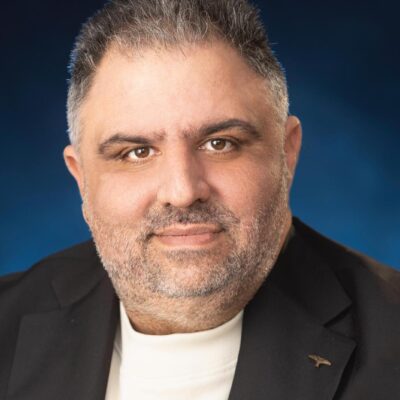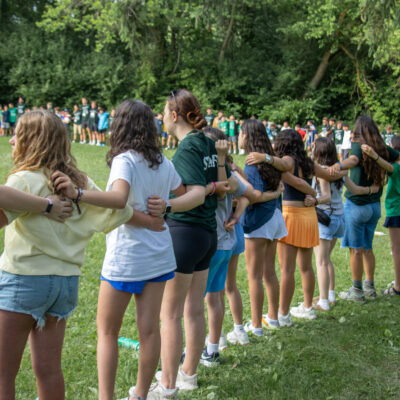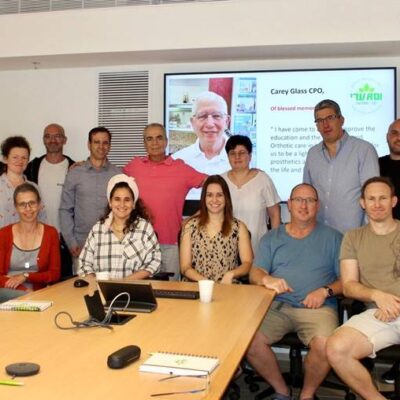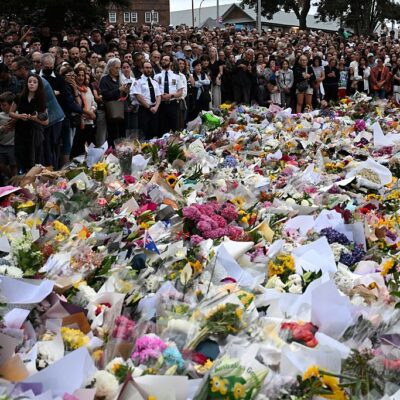Your Daily Phil: What’s happening at JFN’s ‘Israel Ideas Festival’ + Ritualwell gathers a community of writers
Good Tuesday morning!
The Jewish Funders Network’s (JFN) two-day “Israel Ideas Festival” began yesterday online and in-person in both Tel Aviv and New York. It will attract a combined audience of about 350 people, a majority of whom are participating online.
Yesterday’s programming was focused on Israel’s relationship with the Arab world and with international Jewry, with a focus on the implications of the Abraham Accords. Israeli comedian Guri Alfi, whose four-part television program “The New Jew” explored American-Jewish life, spoke in Tel Aviv on the subject of Jewish peoplehood.
Today’s program offers sessions on specific issues, such as at-risk women, the elderly and workforce development. A discussion about impact investing features Diane Isenberg, founder of Ceniarth, who is known for tackling the question of whether such investors must accept possible sacrifices to financial returns in pursuit of social good.
The festival was intended to be an in-person, international event in Tel Aviv that would celebrate the end of the COVID era. Israel’s seven-day quarantine requirement compelled JFN to rework its plans.
At Camp David yesterday, a group of JCC Association of North America leaders dedicated the Chase family Torah and ark at the naval support facility’s Evergreen Chapel. The dedication followed a weekend retreat for the JWB Jewish Chaplains Council, A Celebration of Jews in Service, which included Shabbat dinner and wreath-laying ceremonies at Arlington National Cemetery.
REPLENISHING THE SOURCE
Ritualwell builds a community of writers around its repository of original prayers

iStock
As a leader of the ritual development committee at Bet Mishpachah, Alex Carter is responsible for creating new prayers when congregants at the LGBTQ+ synagogue in Washington, D.C., feel a need for liturgy that speaks more directly to their experience. Carter has been writing such prayers for a decade and has found it rewarding, except that, in the absence of like-minded writers steeped in Jewish texts, it’s been a lonely job, she told eJewishPhilanthropy’s Helen Chernikoff. When she learned about ADVOT@Ritualwell, an online community for writers focused on liturgy and other religious forms — she knew immediately that she had found a literary home.
An organic online community: “It’s tough when you’re writing prayers or piyyut [liturgical poems] in a poetry group when everyone is quite secular, and not Jewish,” said Carter. “They’re appreciative, but they don’t have the textual background to really figure it out.” ADVOT, which means ripples in Hebrew, emerged from Ritualwell, Reconstructing Judaism’s online repository of original prayers and rituals, said Hila Ratzabi, a poet who is Ritualwell’s director of virtual content and programs. Ratzabi noticed that a community of writers was forming around Ritualwell’s “immersions” — online writing sessions of about 10 people. They were commenting on each other’s work on the site, meeting each other during the sessions and becoming muses to each other.
Expanding the tent: Funded by a $20,000, one-year grant from Lippman Kanfer Foundation for Living Torah, ADVOT consists of a monthly interactive salon, weekly writing studios during which participants write independently but in community on Zoom and one-on-one mentoring from Ratzabi four times a year. Ritualwell was founded in 2001 by Jewish feminists to foster the creation of content relevant to women’s lives, such as a prayer for a baby girl’s naming ceremony, or a healing ritual after a miscarriage, Ratzabi said. There are now more than 2,200 pieces on the site, and its scope has grown to include the LGBTQ and disability communities, issues of racial justice and inclusion, responses to natural disasters and the coronavirus pandemic.
HEARD LAST NIGHT
Lipstadt: Sunrise DC move to boycott Jewish groups an ‘overtly antisemitic act’

Elisabetta A. Villa/Getty Images
Deborah Lipstadt, the Biden administration’s nominee to be the State Department special envoy to monitor and combat antisemitism, discussed her nomination, the recent antisemitism controversy involving the Sunrise Movement’s D.C. chapter and her approach to and concerns about modern antisemitism at an event on Monday night, reports Jewish Insider’s Marc Rod. The Holocaust historian and Emory University professor addressed a virtual audience from the Combined Jewish Philanthropies of Greater Boston. Her participation in that event was a somewhat unusual move for a nominee awaiting Senate confirmation, but offered clues as to how she might tackle the position if confirmed.
Sunrise story: Lipstadt addressed a recent statement from the D.C. chapter of the climate activist organization Sunrise Movement, in which the group announced it would not collaborate on voting rights issues with several pro-Israel Jewish groups. “It was an overtly antisemitic act,” Lipstadt said. “If you support the existence of the State of Israel according to this, then you are a racist… What it is saying is that, ‘You Jews, as a people, you do not have a right to a national identity.’” She noted that the group did not have the same objections to non-Jewish groups that also support Israel, like the American Federation of Teachers.
Campus beat: Lipstadt also drew a distinction between the Boycott, Divestment and Sanctions movement at large and individual supporters of BDS, particularly students on college campuses who she said may have “backed into antisemitism… Young people on campuses who support BDS because they see it as a way of changing Israel’s policies, I don’t label them as antisemitic. I think they’re wrong. I think it’s a mistake,” she said. “But if you look at the founding documents of the BDS movement, you see an effort to destroy the State of Israel. There’s no question about it. That I find antisemitic.”
Stepping in: Lipstadt said she’s been asked why, given her tenured position at Emory, she decided to take up the role, and that initially she did not want to be considered. “I wasn’t going to let my name be put in the hat, but someone said to me, ‘Deborah, you can make a difference,’” she recalled at the event. “And I can think of no better thing to aim at being able to do. I won’t solve the problem, no one person can solve the problem. But if I can make a difference… dayenu, it will be enough.”
GROWING OPPORTUNITY
How we talk about our day schools

Prizmah
“The upward trend in enrollment is a precious opportunity for all who care about day schools to both celebrate and to focus on building a strong Jewish future,” writes Amy Adler, senior director of catalyzing resources at Prizmah, in an opinion piece for eJewishPhilanthropy.
Net enrollment increase: “Prizmah’s recently released Enrollment Pulse Survey Report underscores the impact of enrollment growth in the North American Jewish day school field. With 146 schools responding (more than half of the schools in the field), the data supports the same trend: For the first time since 2008, there is a measured net enrollment increase in North American Jewish day schools. In both of the last two enrollment cycles, we have seen growth.”
The data is clear: “As reported in this data, as well as in the study Prizmah released earlier this month, ‘Seizing the Moment: Transferring to Jewish Day School During the COVID-19 Pandemic,’ which studied the mindsets of newly enrolled Jewish day school families, new students are planning to stay even after the pandemic benefits of being in-person are no longer relevant. Increases were seen across denominational and geographic lines, with a net gain of 3.7% from September 2019 to September 2021… To build on the momentum of #Jewishdayschoolstrending, we need to recognize, communicate and actualize the value of Jewish day schools intentionally.”
TIMELESS WISDOM
Global vaccine equity: To save a life is to save a world

iStock
“Like you, I wish that by now we could say we are freed from the grips of the COVID-19 pandemic. For a few weeks this past summer, many of us in the U.S., especially the vaccinated, were starting to believe that COVID might become a thing of the past — but we now know that this is far from being true,” writes Robert Bank, president and CEO of American Jewish World Service, in an opinion piece for eJewishPhilanthropy.
On my mind: “Thinking globally, what consumes me the most is the tragic lack of vaccine access and the pernicious immorality with which certain governments have allowed this pandemic to exacerbate long-standing inequities in the world’s most vulnerable communities: people who do not have food and shelter, whose human rights are violated daily and who are striving to live healthy lives against great odds.”
We must act: “As Jews who are deeply committed to global justice, we know that we must act. In our tradition, we seek to transform the wisdom of earlier generations into bold action today. We know from studying Pirkei Avot — the Ethics of Our Ancestors, codified in the Mishnah some 2,200 years ago — that when one saves a life, it is if they have ‘saved an entire world.’ And the rabbis of the Talmud declared that one can even supersede Jewish law in order to save lives. In our tradition, there is no ‘I’ that can exist separate and apart from shared needs, shared obligations and shared responsibilities. We value each person’s life and infinite dignity, because we all flow from the same well of life, and we are all bound to one another’s fates.”
Worthy Reads
Glass Ceiling: Jewish Insider’s Tamara Zieve interviews Sawsan Natur-Hasson, who made history by becoming the country’s first female Druze diplomat. “When Sawsan Natur-Hasson was growing up in a Druze village in northern Israel, there was no such thing as a female role model for a budding diplomat. The path from Dalyat al-Carmel, a tradition-minded hill town on Mount Carmel, to Israel’s Ministry of Foreign Affairs, where she is today the director of the Middle East Economic Relations Department, had not been blazed. And while a decade has passed since she became the first Druze woman to join the country’s diplomatic corps — and few have followed her lead — she remains optimistic that the door she kicked open will stay that way.” [JI]
Historical Inspiration: In Harvard Business Review, Claudio Fernandez-Araoz suggests that instead of “getting back to normal” as the coronavirus pandemic eases, those who want a life of “excellence and impact” should consider forging a new path, and think about the example of Ignatius of Loyola, founder of the Jesuits. Originally a member of both the military and the Spanish court, Ignatius was injured and suffered a series of other setbacks that inspired him to change his life by becoming a priest and creating the world’s largest higher education network. “This man, whose name derives from the Latin word ignis, meaning fire, turned uncertainty into opportunity by reigniting his purpose, becoming a better version of himself, and making a difference.” [HBR]
Stormy Weather: COP26 — also known as the United Nations Climate Change Conference, starting Sunday in Scotland — is the latest in a series of environmental meetings by which the planet’s countries try to solve problems that are impossible for any one nation to address, writes Shelley Inglis in The Conversation. The thrust of the negotiations revolve around the possibility of whether emissions can be cut to “net zero” by 2050, especially by helping poorer countries transition to clean energy. “This is an important issue of justice for many developing countries whose people bear the largest burden from climate change but have contributed least to it,” Inglis concludes. [Conversation]
Man In The Middle: Neither his Jewish Israeli colleagues in government nor the Palestinian press embrace Mansour Abbas, an Arab Israeli member of Knesset whose Ra’am party joined Yair Lapid and Naftali Bennett’s government after the pair formed a power-sharing agreement last March, reports Ruth Margalit in a New Yorker profile of Abbas. Yet the politician, whose focus is on not on Palestinian statehood but on improving life for the some two million Arabs who live in Israel proper, achieved many of his goals by conditioning his support for the new government on about $10 billion for housing, education and welfare in Arab communities. The riots in Arab-Israeli towns that broke out in May during the conflict between Hamas and Israel tested Abbas’s support, but he doubled down on his pragmatic approach. “This is our ideology,” he said. “This isn’t just ‘civic.’ We’re talking about a matter of life and death. It’s bigger than nationality or religiosity or ideology.” [NewYorker]
Community Comms
Apply! Want to join the team at Jewish Insider/eJewish Philanthropy? We’re looking for a top-notch philanthropy editor. Learn more here.
Be featured: Email us to inform the eJP readership of your upcoming event, job opening, or other communication.
Word on the Street
The American Jewish Committee released its 2021 “State of Antisemitism in America” report… The Cohen Center for Modern Jewish Studies, along with NORC at the University of Chicago, a research institute, published “Jewish Chicago: Who We Are”… Talia Lefkowitz, host of the “Five-O-One” podcast, interviews Sharsheret CEO Elana Silber… A kosher meat restaurant, HaMakom, is opening in the new George Washington University Hillel building… The Jewish Education Project is conducting a census to learn about enrollment, program venues and staffing and budgets and various forms of part-time Jewish education… Schmidt Futures, in partnership with the Rhodes Trust, announced the inaugural cohort of Rise, a $1 billion philanthropic commitment by Eric and Wendy Schmidt, that assists young people who are working in service to others… The Rockefeller Foundation is investing up to $150 million in support of efforts to detect, mitigate and prevent pandemics…
Pic of the Day

National Library of Israel
Fourteen letters penned in the 1940s by the rabbi known as the “Hazon Ish” have been donated to the National Library of Israel in Jerusalem by the family of their recipient, Rabbi Zvi Yehuda, one of the rabbi’s students.
Birthdays

Rich Moffitt via Wikimedia Commons
Figure skater who won a 2006 Olympic silver medal, Alexandra Pauline “Sasha” Cohen…
Former chief justice of the New Jersey Supreme Court, Deborah Tobias Poritz… Veteran Israeli war correspondent, Ron Ben-Yishai… Actress best known as one of stars of “Charlie’s Angels,” Jaclyn Smith (family name was Kupferschmidt)… Chiropractor in White Plains, Leonard Linder… Certified life coach and hypnotherapist, Evie Sullivan… CEO at MDI Real Estate Services in Grand Blanc, Mich., Gary Hurand… Former Secretary of State Hillary Rodham Clinton… Media critic at The Baltimore Sun, assistant professor at Goucher College and the author of The Jews of Prime Time, David Lee Zurawik… Aventura, Fla., resident, Cecilia Kleiman… Illustrator and graphic memoirist, Martin Lemelman… National director of development at the Simon Wiesenthal Center’s Museum of Tolerance, Janice Prager… Rabbi of Congregation K.I.N.S. and dean of Ida Crown Jewish Academy in Chicago, Leonard Matanky, …. Democratic staff director and chief counsel for the House Judiciary Committee, Perry Howard Apelbaum… Director of communications at the Washington Institute for Near East Policy, Jeffrey Rubin… Pulitzer Prize-winning author, Stacy Madeleine Schiff… Cultural commentator and mathematician, he is a managing director of Thiel Capital, Eric Ross Weinstein… Founding partner and president of Global Strategy Group, Jefrey Pollock… Screenwriter, director, producer and editor, Jessica Sharzer… Canadian-born television and film actor, David Julian Hirsh… Staff writer for The New York Times and author of the 2019 hit novel Fleishman Is In Trouble, Taffy Brodesser-Akner… Senior product manager at CoStar Group, Danielle Feldman… U.S. Army Ranger, Evan May… Tel Aviv resident, Dr. Alberto Calo…
Email Editor@eJewishPhilanthropy.com to have your birthday included.


 Add EJP on Google
Add EJP on Google






